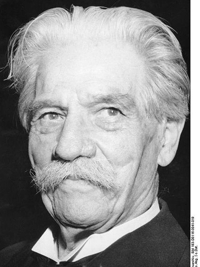Lifetime
Born: 14.01.1875, KaysersbergPassed away: 04.09.1965
About
Albert Schweitzer (14 January 1875 – 4 September 1965)was a Franco-German (Alsatian) theologian, organist, philosopher, and physician. He was born in Kaysersberg in the province of Alsace-Lorraine, in the German Empire. Schweitzer challenged both the secular view of Jesus as depicted by historical-critical methodology current at his time in certain academic circles, as well as the traditional Christian view, depicting a Jesus Christ who expected and predicted the imminent end of the world. He received the 1952 Nobel Peace Prize for his philosophy of "Reverence for Life", expressed in many ways, but most famously in founding and sustaining the Albert Schweitzer Hospital in Lambaréné, now in Gabon, west central Africa (then French Equatorial Africa). As a music scholar and organist, he studied the music of German composer Johann Sebastian Bach and influenced the Organ reform movement (Orgelbewegung).
Schweitzer's passionate quest was to discover a universal ethical philosophy, anchored in a universal reality, and make it directly available to all of humanity.
